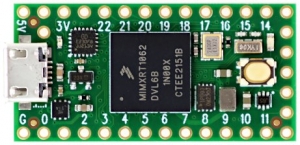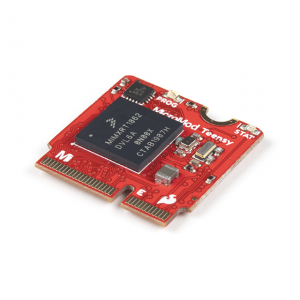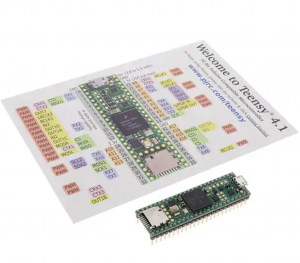Teensy LC USB Microcontroller Development Board
- Powerful 32-bit USB microcontroller development board
- ARM Cortex-M0+ processor at 48 MHz, 62K flash, 8K RAM
- Current output: 5mA + four 20mA milliAmps
- Ideal for inexpensive "Internet Of Things" projects
Teensy LC USB Microcontroller Development Board
Description
- Powerful 32-bit USB microcontroller development board
- ARM Cortex-M0+ processor at 48 MHz, 62K flash, 8K RAM
- Current output: 5mA + four 20mA milliAmps
- Ideal for inexpensive "Internet Of Things" projects
The Teensy LC USB Microcontroller Development Board is a powerful 32-bit microcontroller board, with a rich set of hardware peripherals. Teensy-LC delivers an impressive collection of capabilities to make modern electronic projects simpler. It features an ARM Cortex-M0+ processor at 48 MHz, 62K Flash, 8K RAM, 12-bit analog input & output, hardware Serial, SPI & I2C, USB, and a total of 27 I/O pins. Teensy-LC will be ideal for inexpensive "Internet Of Things" projects when paired with a ESP8266 Wifi module, which requires a fast hardware serial or SPI port.
32 bit ARM Cortex M0+ Processor
The Cortex-M0+ processor is a powerful, full 32-bit CPU, designed for lower power, lower cost devices. Cortex-M0+ at 48 MHz is much faster than 8-bit AVR processors at 16 MHz, especially when manipulating 16 and 32 bit variables.
Efficient USB Communication
Teensy-LC supports USB Serial, MIDI, Keyboard (international layouts), Mouse, Joystick, and RawHID protocols. A full set of 16 bidirectional USB endpoints are supported by the hardware, allowing any type of USB device.
Analog Input & Output at 12 Bit Resolution
Analog signals are critically important to many projects. Teensy-LC has 13 pins than can function as analog inputs. The effective analog resolution is 12-bits. It also has a true 12-bit digital to analog converter, for an analog output signal.
.png)
Specifications
- Processor: MKL26Z64VFT4
- Core: Cortex-M0+
- Rated speed: 48 MHz
- Flash memory: 62kbytes
- Bandwidth: 96 mbytes/sec
- Cache: 64 bytes
- RAM: 8kbytes
- Digital I/O: 27 pins


.jpg)






